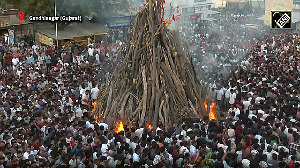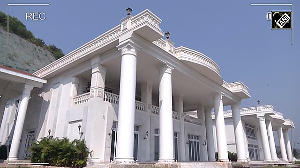External Affairs Minister K Natwar Singh delivered this facinating lecture at Brown University, Providence, Rhode Island, USA.
India has a larger message for the world, one that acquires even greater relevance as we demonstrate an ability to meet major challenges of our times. I hope my argument is, therefore, viewed as more than a national case made by a foreign minister.Certainly, I would like to believe that three decades as a diplomat have enabled me to bring some objectivity to the subject. Two subsequent decades in political life led to a deeper understanding of the daily struggles of people who articulate through their routine an outlook to life.
As I seek to balance the two and reflect on the intricacies of our social structure, I can only imagine how bewildering we -- in John Kenneth Galbraith's famous phrase 'a functioning anarchy' -- must be to others.
It is said that when President Ulysses Grant went on a world tour and finally reached Japan, his meeting with the Meiji Emperor -- which must have been a cultural experience in itself -- saw them both express their perplexity about India. One can almost imagine them agreeing on the notion that everything that is said about India is true, and so too is its opposite!
This India, so fascinating and yet so incomprehensible to many, is today emerging from the recesses of history and assuming a prominent place in the global arena. It seeks to be understood better but its unique nature makes that very process a challenging endeavour.
India's rise, for example, has not been an exercise in assertion on past traditional patterns in world history. Instead, it has been incremental to the point of being imperceptible, and natural enough to be harmonious. Demographic trends and historical traditions have come together to make India, along with the United States, China, Europe, Japan and Russia, among the key players of this century.
This was obviously not preordained but a consequence of policy choices, governance quality and societal mores. The scale and complexity of our achievements merit serious evaluation. After all, it is not every country that, even while addressing primary issues like health, shelter and literacy, is simultaneously able to compete at a global level in technology, business and culture.
What makes this phenomenon further worth studying is the framework in which these processes of change are unfolding. The message and the medium are both equally instructive to others facing similar problems. Our emergence has a particular implication for the United States, another large multi-cultural democracy.
When India became independent 58 years ago, we made decisions that, even in retrospect, can only be described as incredibly brave. Consider that we were emerging from two centuries of colonial rule and poverty, illiteracy and obscurantism were still rife. Yet, as early as 1931, Mahatma Gandhi and the Indian leadership chose to opt for a democratic form of government with universal adult franchise as its basis.
It was this bold step that actually took democracy beyond its Euro-Atlantic confines and gave it a universal character. Till then, India was considered more an embodiment of a civilisation than a definition of a conventional nation state. It took a democratic construct to bring together its very many languages, ethnicities and customs and provide it a firm binding force.
Serving as a common denominator for unity to come out of this enormous diversity, democracy enabled our people to become participants in national rebuilding and underlined their interest in its success. Our leaders at the time of
Independence could have easily opted to be a one-party state.
Many other post-colonial societies did and the Congress party certainly dominated the political scene. It is a tribute to their wisdom that they saw our future in political pluralism. Elections over the years at various levels have strengthened people's self-perception as stakeholders in the system.
Democracy also facilitated the rapid dissolution of kingdoms and princely states that dotted the Indian map when the British finally left and thereby, laid the foundation for a modern state. Americans, perhaps more than other people, can identify with an exercise of constructing a society on principles of freedom, human rights and rule of law.
Although two centuries apart, there are striking similarities between the debates in our two countries during the process of Constitution making. The difference was that India's circumstances were infinitely more challenging. The success of Indian democracy transcends cultural and geographical limitations earlier ascribed to the political values on which they are based.
The building of a democratic India has not been an easy exercise. There is no historical precedent for a billion people determining their collective destiny through a mechanism of consent. There is no blueprint or textbook that sets out a road map. We have improvised along our way, trusting the innate wisdom of our people.
It is one of the great wonders of our time that a largely illiterate society -- only 14 per cent were educated in 1947 -- could
address their problems with such maturity and moderation. Some credit must go as well to the manner in which traditional ways, particularly village-level self-government, have been adapted to address contemporary challenges.
Our approach also took into account that centralised prescriptions are not always the most effective for problem solving. Establishing democratic structures and making them durable was highly dependent on effectively utilising local and regional knowledge that is ingrained in every society.
In India's case, by tapping into traditions of pluralism and networks at various levels, democracy emerged as a credible political way for post-colonial India rather than a mere imitation of colonial forms.
Structures at local, regional and federal levels ensure that identities are maintained and reconciled at the same time. There are nations that apprehend the consequences of autonomy for their integrity and see in federalism a stepping stone for secessionism.
Our experience sends a contrary message. Multiple power structures, coexisting and reinforcing each other, is one more indication of respect for choice.
Elections in India currently encompass an electorate of almost 700 million. It is a political statistic not easy to digest. Equally worth noting is that these votes have often resulted in changes of government at both the federal and state level. It is the peaceful transfer of power that is the true test of democracy. Not all societies claiming to be one have passed it. India has -- with flying colours!
The Indian experiment has broken new ground in many ways. Over the last half century, dissidents -- regional, ethnic, religious or socio-economic -- have found an accommodating political culture that has aided their return to the mainstream. We have even had occasions when those who took up arms against the Indian State finally joined democratic politics and assumed leadership responsibilities.
One testimony to our strength is the example -- the first in history -- of a Communist Party coming to power through electoral means. In the Indian ethos, no one is outside the pale and we have stretched the definition of an inclusive society to its
limits and beyond. Ours is an exercise in continuous management of contradictions. So that we do not take it for granted, perhaps it is useful to reflect just for a moment what could have happened had this experiment not succeeded.
The roots that liberal democracy struck in India find some explanation in our tradition of social and religious pluralism. Unlike the West, where the separation of Church and State was a pre-requisite for secularism, its Indian manifestation appears to draw strength from an ethos of multiplicity and choice. The Indian intellectual tradition is an intensely individualistic one, as indeed are many schools of religious and philosophical thought.
Secularism in Western intellectual tradition has a clearly non-religious connotation while the Indian understanding, in contrast, translates into equal respect for all religions. Transposed to the political level, it really captures the essence of democracy.
It is no accident that the advocates of democracy in India like Mahatma Gandhi and Pandit Jawaharlal Nehru were also equally strong proponents of religious equality. Indeed, their vision gained popular acceptance and legitimacy precisely because it specifically addressed the needs thrown up by a complex social structure.
They were careful not to fabricate an artificial majority culture in order to create a national identity. They were acutely conscious that in this vast land, everyone is a minority and the difference is only one of degree. The internal balance of a society composed of minorities is distinctly different from one where a dominant majority sets its terms vis-à-vis its minorities.
In such a paradigm, tolerance as an attitude is not enough because it appears too grudging and meagre. A stronger embrace of diversity has to be the working principle and its wholehearted acceptance a virtual necessity. We have, admittedly, forces within our society that seek to create a majoritarian culture by reshaping identities and self-perceptions. The reduction of the
complexity of India into primitive religious definitions cannot succeed because it runs up against a contrary ground reality.
The truth is that our people, secure in their identities, are ready to accept differences and can be non-conformist in their own ways. Diversity has accentuated rather than diminished our nationhood.
Democracy and secularism have not only been values that have sustained the development of modern India. They have also provided effective defences against terrorism unleashed by ideologies of intolerance and fundamentalism. India's battle in that regard predates 9/11 and no country has paid a higher price to safeguard its core democratic beliefs. Our ability to rise to this challenge has depended on the denial of ground fertile for the spread of such extremist thinking. This was made possible because all sections of India believed that their grievances can be addressed through the democratic process.
Admittedly, we have had difficult experiences where narrower identities have disrupted the social fabric. But in the long run, all communities understand that the Indian state does not discriminate. It is a testimony to the working of our systems that an organisation like Al Qaeda has, to date, not been able to recruit adherents in India. Global efforts at combating terrorism could look at the Indian example and examine whether our political culture has lessons that could be usefully applied elsewhere.






 © 2025
© 2025